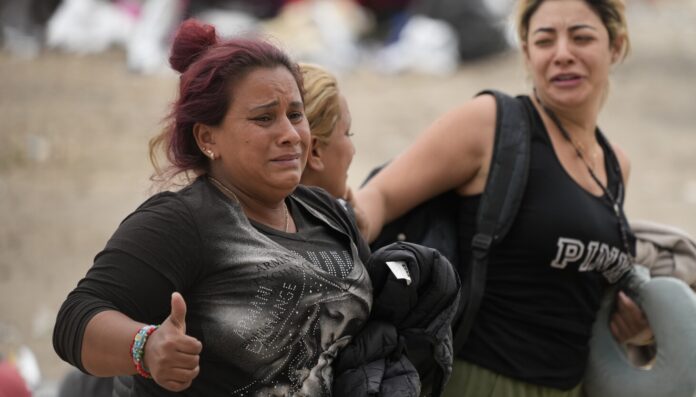Donald J. Trump will return to the presidency after yet another campaign soaked in anti-immigration rhetoric.
Unknown to many Americans is the fact that among the migrants arriving at our southern border are women who have fled rape, mutilation, kidnappings, threats and extortion by husbands, boyfriends or gang members. Applying for asylum in the United States is their hope for relief from severe gender-based violence.
Unfortunately, the right-wing Project 2025 agenda envisions a complete disruption of the legal immigration system, including targeting women by codifying that domestic and gang violence won’t be grounds for asylum. It would also make it substantially more difficult for these applicants to meet asylum criteria.
We spent five years engaged in research with women seeking asylum in this country from Central America and Mexico, as well as immigration lawyers and retired judges.
What we learned about the women and their motivations for seeking asylum shows just how deliberately brutal the Project 2025 plan will be if implemented. And we argue it’s not the end of asylum that our nation needs — it’s the ability for women fleeing gender-based violence to more easily win their cases to remain here and live free lives.
Since the Cold War, the U.S. asylum system has offered people who have suffered persecution the opportunity to plead for the right to remain in the United States and escape future violence.
Under both international and national law, the right to seek asylum is enshrined as necessary to ensure human rights. These laws contain strict criteria that an applicant must meet to win her case, including proving she will suffer persecution if returned to her home country. She also must prove she suffered persecution because of her membership in one of five protected classes: race, religion, nationality, political opinion or membership in a particular social group.
Project 2025 wants to eliminate most women’s ability to win asylum, by either stating that survivors of domestic and gang violence do not qualify for protection under these rules or eliminating the particular social group category entirely.
‘End up in black bags’
We would be remiss if we did not note some of the personal stories of the women we interviewed.
They include Teresita, a 29-year-old Honduran who left her daughter behind with her parents to escape the man who put a gun to her head and threatened to kill her.
Guadalupe, whose father was murdered in the street by gang members, who then told her that she and her family would “end up in black bags” if they went to the police.
Alejandra’s husband raped her and scalded her with coffee. Yolanda was kidnapped and raped by a gang member after refusing to become his girlfriend.
These women simply want the basic human rights that all should share: a safe place to live and raise families, and the chance to work and to provide for themselves.
During our research, we witnessed 36 closed asylum hearings in which women from Central America made their case before an immigration judge. Often, the women who suffered violence went to law enforcement at home, only to be told police were too frightened of gangs to intervene or to learn police expected them to comply with gang imperatives (such as paying bribes).
Because their governments refuse to help them, these women do qualify to apply for asylum here and should be allowed to seek it.
To avoid a human rights catastrophe, at minimum, the asylum system should remain in place, and attempts to terminate our legal asylum system and forfeit our international responsibilities must be stopped.
Women must have a fair opportunity to apply for asylum and have their cases heard. We advocate for adopting the Refugee Protection Act proposed in 2022. That law would have codified that people fleeing persecution by non-state actors may meet the criteria for asylum, including women who are forced to flee their home countries because of gang and domestic violence.
We also call for additional immigration judges and resources for the immigration courts.
We suspect most Americans, when presented with the evidence of the crimes suffered by the women we interviewed, would want better for them than the senseless loss of human rights promised by Trump and Project 2025.
Carol Cleaveland is an associate professor of social work at George Mason University. Michele Waslin is assistant director of the Immigration History Research Center at the University of Minnesota. They are the co-authors of the new book “Private Violence: Latin American Women and the Struggle for Asylum.”
The views and opinions expressed by contributors are their own and do not necessarily reflect those of the Chicago Sun-Times or any of its affiliates.
The Sun-Times welcomes letters to the editor and op-eds. See our guidelines.
Get Opinions content delivered to your inbox.
